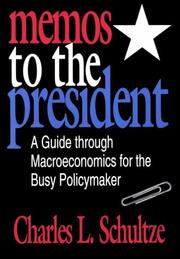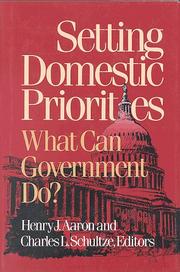| Listing 1 - 4 of 4 |
Sort by
|

ISBN: 0815777787 Year: 1992 Publisher: Washington, D.C. Brookings Institution
Abstract | Keywords | Export | Availability | Bookmark
 Loading...
Loading...Choose an application
- Reference Manager
- EndNote
- RefWorks (Direct export to RefWorks)
Macroeconomics --- 330.362 --- 338.246 <73> --- 338 <73> --- 331.31 --- 333.110 --- 333.846.0 --- 336.01 --- 336.61 --- AA / International- internationaal --- US / United States of America - USA - Verenigde Staten - Etats Unis --- Economics --- Economisch beleid --- Centrale banken en parastatale kredietinstellingen: algemeen. Overheidsbemoeiïng inzake organisatie en verdeling van het krediet --- Verband tussen het monetair, bank- en kredietbeleid en de economische ontwikkeling: algemeenheden --- Overheidsbemoeiing op economisch gebied --- Financieel beleid --- United States --- Economic policy. --- Economic policy and planning (general) --- United States of America
Book
ISBN: 0815719035 Year: 1992 Publisher: Washington, D.C. : Brookings Institution,
Abstract | Keywords | Export | Availability | Bookmark
 Loading...
Loading...Choose an application
- Reference Manager
- EndNote
- RefWorks (Direct export to RefWorks)
When policymakers are in need of economic advice, professional economists are never far away. Policymakers, journalists, and citizens all rely on experts to explain various economic developments and policy proposals. While it is fortunate that experts are close at hand, those concerned with choosing or evaluating economic policies should themselves have an understanding of how the economy works. Unfortunately, many policymakers and interested citizens currently lack such knowledge; and they need to know at the least the basics of macroeconomics to make informed decisions on their own. In this insightful book, Charles L. Schultze employs an imaginative format for explaining to busy policymakers and citizens how the economy works and what issues are likely to affect macroeconomic policy. He imagines that the next president has promised to devote one hour a week to learning about key economic principles and has asked the chairman of the Council of Economic Advisers for instruction. The book is written as a series of memos to the president on the principles and policy issues that should be understood before making macroeconomic policy judgements. A former chairman of the Council of Economic Advisers himself, Schultze clearly explains the key relationships as a background for policy decisions--relationships among domestic and foreign economic forces, and government policies and economic outcomes. The memos rely heavily on the use of real-world examples from recent economic events and policy debates. They focus principally on such policy-related issues as inflation, unemployment, long-term economic growth, and the flow of international trade and capital. The series of short, easy-to-read memos is divided into three groups: the first presents the background, explaining why it is particularly important for policymakers to distinguish between those economic forces that affect total demand in the economy and those that affect total supply; the second addresses the problem of economic stability; and the third looks at long-term economic growth.

ISBN: 0815700547 Year: 1992 Publisher: Washington, D.C. Brookings Institution
Abstract | Keywords | Export | Availability | Bookmark
 Loading...
Loading...Choose an application
- Reference Manager
- EndNote
- RefWorks (Direct export to RefWorks)
Social policy --- Economic policy and planning (general) --- United States of America
Book
ISBN: 0815721153 Year: 1992 Publisher: Washington, D.C. : The Brookings Institution,
Abstract | Keywords | Export | Availability | Bookmark
 Loading...
Loading...Choose an application
- Reference Manager
- EndNote
- RefWorks (Direct export to RefWorks)
In recent years, workers earnings have hardly grown, violence and crime have plagued the inner cities, homelessness and public begging have become commonplace, and family life has greatly deteriorated. With governments facing large deficits and slowly growing revenues, and public distrust in the efficiency of government and elected officials at all-time highs, the authors ask, "What can government do for you?" This book brings together a prominent group of experts to answer this critical question. Edited by Henry Aaron and Charles L. Schultze, two of the nation's most noted and experienced economists, the book focuses on the crucial domestic and social issues confronting America today. Seven vital areas are discussed by the following contributors: Henry Aaron on health care; Gordon L Berlin and William McAllister on homelessness; Linda R Cohen and Roger G. Noll on research and development; John J. DiIulio, Jr., on crime; Frank Levy and Richard J. Murnane on education and training; Isabel V. Sawhill on children and families; and Clifford M. Winston and Barry P. Bosworth on infrastructure. In each problem area, the authors use the results of research and analysis to identify existing or proposed governmental interventions that are likely to work, as well as some that are likely to fail and some that need to be reformed. They then present a budget proposal that not only pays for suggested changes in domestic policy, but brings the budget into virtual balance in ten years.
Government spending policy --- United States --- United States --- Economic policy --- Social policy
| Listing 1 - 4 of 4 |
Sort by
|

 Search
Search Feedback
Feedback About UniCat
About UniCat  Help
Help News
News